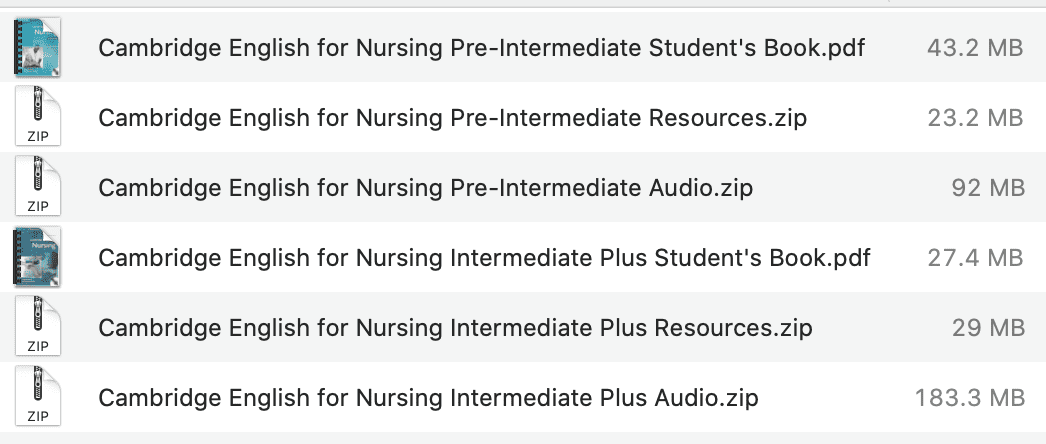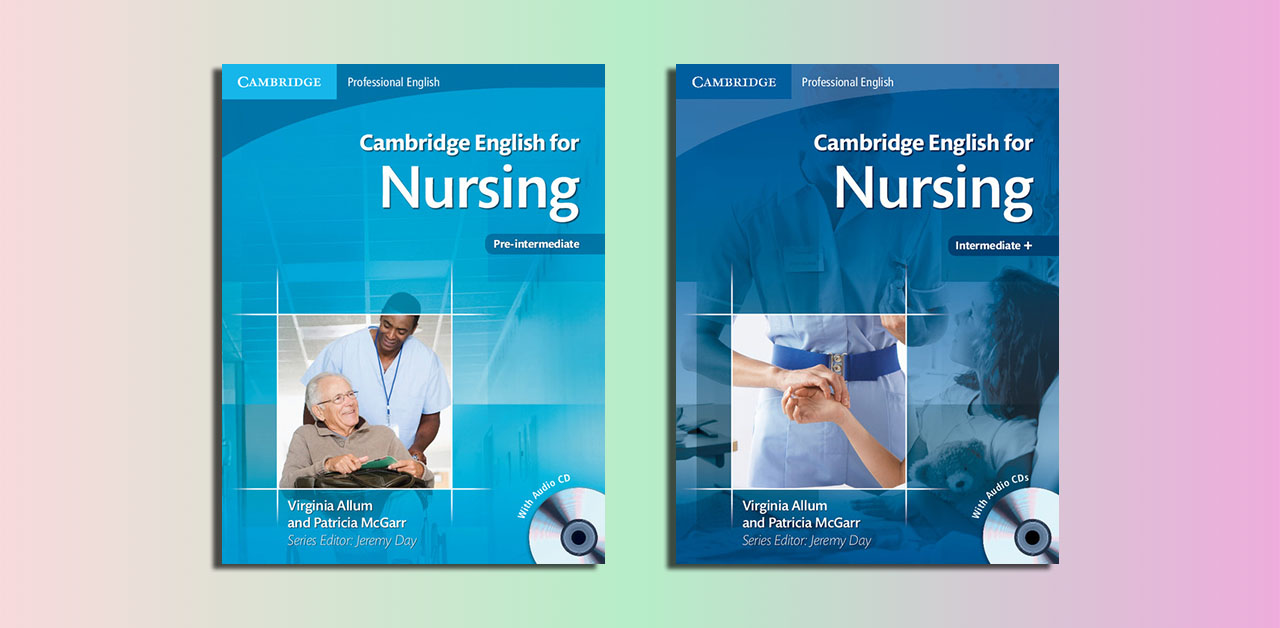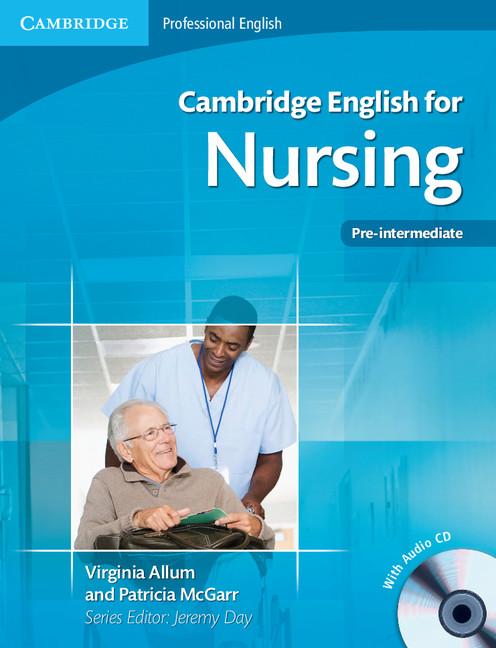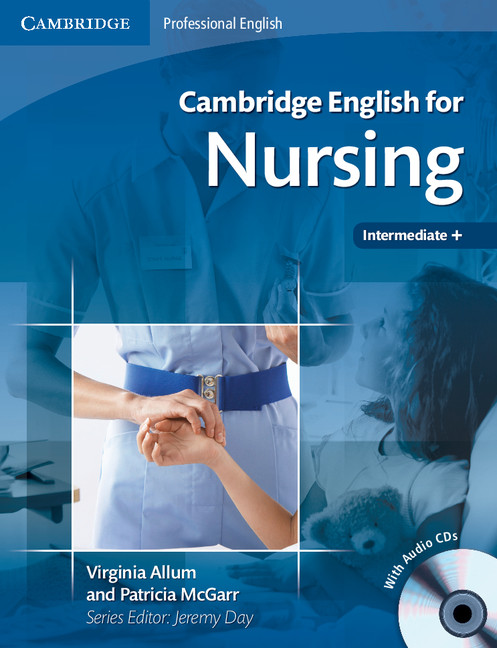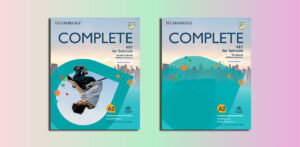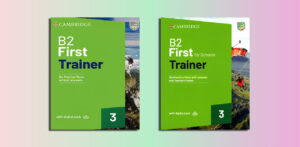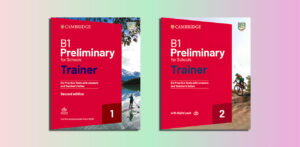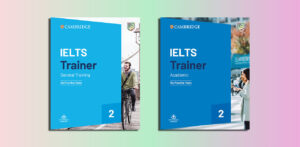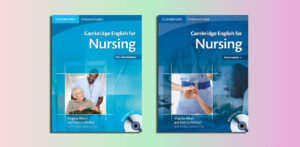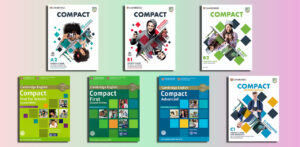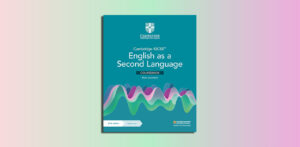Cambridge English for Nursing
Cambridge English for Nursing Pre-Intermediate Student’s Book.pdf – Sample: Click
Cambridge English for Nursing Pre-Intermediate Resources.zip
Cambridge English for Nursing Pre-Intermediate Audio.zip
Cambridge English for Nursing Intermediate Plus Student’s Book.pdf – Sample: Click
Cambridge English for Nursing Intermediate Plus Resources.zip
Cambridge English for Nursing Intermediate Plus Audio.zip
| Name | Price | Buy |
|---|---|---|
| Cambridge English for Nursing (PDFs, Resources) | $6 |
Overview of the “Cambridge English for Nursing” by Cambridge
Contents
| ✅ Coursebook: | Cambridge English for Nursing |
| ✅ Authors: | Virginia Allum, Patricia McGarr |
| ✅ Publisher: | Cambridge University Press |
| ✅ English type: | British English |
| ✅ Levels: | A2, B1 |
| ✅ Publication year: | 2010 |
Cambridge English for Nursing is a specialist ESP (English for Specific Purposes) course from Cambridge University Press designed for nurses and other healthcare professionals whose first language is not English. It focuses on improving both communication skills and specialist medical vocabulary so learners can work more confidently and safely in international or English-speaking healthcare environments. The series is typically offered at Pre-Intermediate (CEF A2) and Intermediate/Intermediate Plus levels, targeting learners who already have basic general English and now need language for real nursing work.
The course places a strong emphasis on listening and speaking in realistic clinical situations such as admitting patients, taking observations, explaining procedures, managing post-operative care, handling pain, checking medications and IV infusions, and giving or receiving hand-over reports. Each unit combines discussion of nursing topics, authentic listening tasks, communication strategies (for example, giving clear instructions or showing empathy), a “medical focus” on anatomy and procedures, and charting/documentation practice with common abbreviations and forms.
Learners work with Student’s Books plus audio material, along with online extensions such as glossaries and extra activities. This makes the course suitable for self-study, in-company training, or vocational nursing programmes. By integrating professional content and language practice, Cambridge English for Nursing helps nurses develop the English they need for safer patient care, clearer teamwork communication, and better relationships with patients and families across cultures.
Cambridge English for Nursing Pre-Intermediate Student’s Book
Who is suitable for “Cambridge English for Nursing”?
Cambridge English for Nursing is designed for a wide range of learners in the healthcare field who need to communicate confidently in English. It is especially suitable for:
1. Practicing nurses working in hospitals or clinics
- Nurses who interact daily with patients, doctors and healthcare teams will benefit from the course’s focus on real hospital communication—taking observations, giving handovers, explaining procedures, and providing patient care in English.
2. Nursing students and trainees
- Learners enrolled in nursing schools, vocational colleges or university programmes who need to build professional medical English early in their studies. The book supports classroom learning and helps students prepare for clinical placements where English is required.
3. Nurses preparing to work abroad
- Ideal for professionals planning to work in the UK, Australia, Singapore, the Middle East or any international healthcare setting. The course develops the essential language needed for safe, accurate and compassionate nursing practice.
4. Healthcare assistants, caregivers and support workers
- Those working in patient care environments—elderly care homes, rehabilitation centres, home care, outpatient clinics—will find the vocabulary and communication training useful for interacting with patients and families.
5. Professionals preparing for English-medium training or exams
- Learners taking medical interviews, skills assessments, or English-for-healthcare tests (such as OET preparation programmes) can use this book to strengthen their communication and medical terminology.
6. Hospitals, clinics and training centres
- Institutions looking to train staff in medical English can use the course for group learning, in-house professional development, or orientation programmes for international recruits.
7. Learners at A2–B1 level
- The course is designed for Pre-Intermediate to Intermediate English levels, making it accessible to those with foundational English who want to specialise in nursing communication.
Overall, Cambridge English for Nursing is suitable for any healthcare professional or student who needs practical, real-world English to work effectively and confidently in clinical environments.
Cambridge English for Nursing Intermediate Plus Student’s Book
The benefits of “Cambridge English for Nursing”
Cambridge English for Nursing offers a comprehensive set of advantages for healthcare professionals, nursing students and institutions looking to improve communication in clinical environments. Its benefits extend across practical language skills, professional confidence and workplace performance.
1. Builds essential medical and nursing vocabulary
- The course introduces accurate terminology related to symptoms, treatments, medications, equipment, body systems and hospital procedures. Learners gain the vocabulary needed to communicate safely with patients and colleagues, reducing misunderstandings in high-risk situations.
2. Enhances real-world communication skills
- Each unit focuses on practical, everyday interactions such as patient admission, pain assessment, monitoring vital signs, post-operative care, giving instructions and delivering handovers. This helps nurses communicate naturally and clearly in English-speaking hospital settings.
3. Improves patient safety and quality of care
- By practising clear communication, active listening and accurate documentation, learners develop the language skills that support safer clinical decisions. The course teaches how to ask for clarification, report changes in patient condition and explain procedures with confidence.
4. Strengthens interpersonal and empathetic communication
- Nurses learn how to show empathy, reassure anxious patients, ask sensitive questions and build rapport. These skills are crucial for patient satisfaction and positive healthcare experiences.
5. Provides training in documentation and charting
- The book includes exercises on medical notes, observation charts, abbreviations and forms. This prepares learners to complete and understand professional healthcare documentation correctly, a key requirement in international settings.
6. Improves listening skills with authentic clinical audio
- High-quality audio recordings expose learners to real hospital conversations, doctor–nurse interactions, telephone calls and ward communication. This builds confidence in understanding various accents and fast-paced medical dialogue.
7. Supports career advancement and international mobility
- For nurses planning to work abroad or in English-medium hospitals, the course provides the communication tools required for job interviews, overseas placements, and adaptation to foreign healthcare systems.
8. Suitable for self-study or classroom use
- Its clear structure, practical tasks and built-in audio support make the course flexible: ideal for individual learning, group classes, vocational programmes or hospital staff training.
9. Boosts confidence in multicultural workplaces
- Learners develop the ability to interact professionally with international colleagues and diverse patient populations. This prepares them for teamwork, interdisciplinary collaboration and multicultural communication.
10. Aligned with real nursing tasks and responsibilities
- All language practice is linked to genuine nursing duties, ensuring that the skills learned can be applied immediately in clinical environments.
Overall, Cambridge English for Nursing equips learners with the language, confidence and professional communication skills needed to deliver safe, effective and compassionate care in English-speaking healthcare settings.
Effective learning strategies for “Cambridge English for Nursing”
To get the best results from Cambridge English for Nursing, learners should combine structured study with real-world practice. The following strategies help nurses, students and healthcare professionals maximise both language development and professional communication skills.
1. Follow each unit in sequence for strong foundations
- The course is designed progressively: vocabulary, communication functions and listening tasks build on one another. Completing units in order ensures a smooth learning curve—from basic patient interaction to more complex clinical communication.
2. Create a personal medical vocabulary notebook
- Record key terms, abbreviations, phrases, ICD-related vocabulary and clinical expressions from each unit. Include example sentences and practice explaining these terms aloud. This builds long-term retention and confidence in using technical language accurately.
3. Practice listening with the audio multiple times
- Listen first for general meaning, then again for key phrases nurses use when giving instructions, asking questions or reporting changes. Mimic the rhythm and tone of the speakers to improve speaking fluency and naturalness.
4. Role-play real nursing situations
- Pair up with classmates or colleagues to practise:
- patient admission
- taking vital signs
- handovers
- medication checks
- pre-/post-operative communication
- dealing with emergencies
- Role-play builds automatic responses and prepares learners for actual clinical conversations.
5. Use the “Medical Focus” sections actively
- Instead of reading passively, explain the body systems, illnesses or procedures in your own words. Teaching others or summarising aloud helps reinforce understanding and builds professional speaking skills.
6. Apply new language directly during clinical practice
- Use new phrases at work when talking to patients (“I’m going to take your blood pressure now”), reporting observations to colleagues, or writing brief notes. Real-world use strengthens retention far more than classroom-only learning.
7. Study documentation and abbreviations carefully
- Regularly practise completing charts, care plans and observation forms similar to those in the book. Understanding abbreviations and note-taking conventions is essential for safety and accuracy in international environments.
8. Combine study with medical English videos and podcasts
- Use supplementary resources to expose yourself to more real hospital English—nurse handovers, patient interviews, doctor explanations. This builds listening stamina and prepares you for fast-paced workplace communication.
9. Review and recycle vocabulary weekly
- Use flashcards (Anki/Quizlet), self-quizzes or quick oral summaries to review older units. Medical vocabulary must be revisited frequently to become active knowledge.
10. Set clear learning goals
- For example:
- “I want to confidently describe post-op care by the end of Unit 6.”
- “I want to understand handover reports without needing repetition.”
- Clear targets help learners stay motivated and measure progress.
Using these strategies consistently helps learners develop accurate medical vocabulary, stronger speaking and listening skills, and greater confidence in real clinical environments. Cambridge English for Nursing becomes far more effective when paired with active practice and continuous exposure to authentic nursing English.

